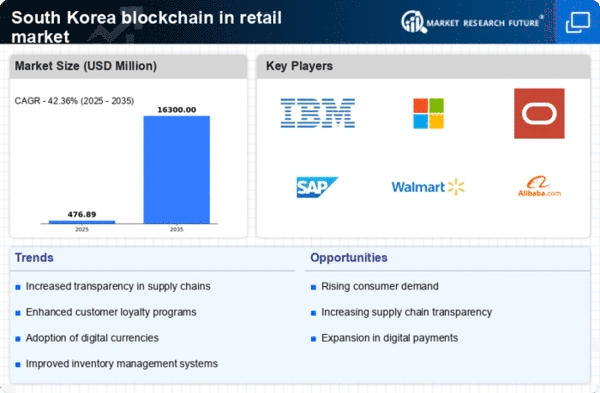Growing E-commerce Sector
The rapid expansion of the e-commerce sector is significantly influencing the blockchain in-retail market in South Korea. As online shopping continues to gain traction, retailers are increasingly seeking innovative solutions to enhance operational efficiency and customer experience. Blockchain technology offers a means to improve supply chain management, secure payment processing, and protect consumer data. With e-commerce sales projected to reach approximately $100 billion by 2026, the demand for blockchain solutions is expected to rise correspondingly. Retailers are recognizing that implementing blockchain can streamline operations and build consumer trust, which is essential in a competitive online marketplace. Consequently, the growth of e-commerce is likely to serve as a catalyst for the adoption of blockchain technology in the retail sector.
Enhanced Customer Engagement
Enhanced customer engagement is emerging as a pivotal driver in the blockchain in-retail market in South Korea. Retailers are leveraging blockchain technology to create personalized shopping experiences, fostering deeper connections with consumers. By utilizing blockchain for loyalty programs, retailers can offer transparent and secure rewards systems that incentivize repeat purchases. This approach not only enhances customer satisfaction but also provides valuable data insights for retailers. Reports indicate that retailers employing blockchain-based loyalty programs see an increase in customer retention rates by approximately 25%. As the competition intensifies, the ability to engage customers effectively through innovative blockchain solutions will likely become a key differentiator in the market.
Integration of Smart Contracts
The integration of smart contracts within the blockchain in-retail market is poised to revolutionize transaction processes in South Korea. Smart contracts automate and enforce agreements between parties, reducing the need for intermediaries and minimizing transaction costs. This technology can streamline various retail operations, from inventory management to payment processing. For instance, retailers can automate payment releases upon delivery confirmation, enhancing efficiency and reducing disputes. The potential for cost savings is substantial, with estimates suggesting that smart contracts could reduce operational costs by up to 30%. As South Korean retailers increasingly recognize these benefits, the adoption of smart contracts is likely to accelerate, driving growth in the blockchain in-retail market.
Rising Demand for Traceability
The blockchain in-retail market in South Korea is experiencing a notable surge in demand for traceability solutions. Consumers increasingly seek transparency regarding the origins of products, particularly in sectors such as food and fashion. This trend is driven by heightened awareness of ethical sourcing and sustainability. According to recent surveys, approximately 70% of South Korean consumers express a preference for brands that provide clear information about product sourcing. Blockchain technology offers a robust solution by enabling retailers to track and verify the journey of products from origin to shelf. This capability not only enhances consumer trust but also aligns with regulatory requirements for product safety and authenticity. As a result, retailers adopting blockchain solutions are likely to gain a competitive edge in the market, fostering customer loyalty and potentially increasing sales.
Regulatory Support for Blockchain Adoption
Regulatory support is playing a crucial role in the growth of the blockchain in-retail market in South Korea. The government has been actively promoting the adoption of blockchain technology across various sectors, including retail. Initiatives aimed at fostering innovation and ensuring consumer protection are being implemented, creating a conducive environment for blockchain solutions. For instance, the South Korean government has allocated significant funding for research and development in blockchain applications, which is expected to bolster the market. Furthermore, regulatory frameworks are being established to address concerns related to data privacy and security, thereby encouraging retailers to adopt blockchain solutions. This supportive regulatory landscape is likely to accelerate the integration of blockchain technology in retail operations.
















